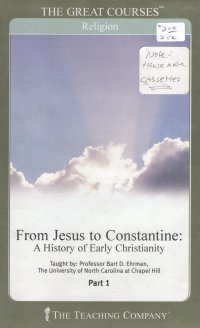 I bought this in September, and I started it in the car not long thereafter since my primary driver still has an audiocassette player in it. But it’s getting long-in-tooth (210,000 miles, something unimaginable in my youth when my cars crapped out at ~120k miles) and it won’t be too long until its failure is just another thing on the pile of things. And my trip to Iowa in October involved a rental car, and base unit newer vehicles don’t even have CD/DVD players stock, so my great accumulation of these CD and DVD courses might prove to be a poor investment. At least until I downgrade the audio and video options in a new vehicle.
I bought this in September, and I started it in the car not long thereafter since my primary driver still has an audiocassette player in it. But it’s getting long-in-tooth (210,000 miles, something unimaginable in my youth when my cars crapped out at ~120k miles) and it won’t be too long until its failure is just another thing on the pile of things. And my trip to Iowa in October involved a rental car, and base unit newer vehicles don’t even have CD/DVD players stock, so my great accumulation of these CD and DVD courses might prove to be a poor investment. At least until I downgrade the audio and video options in a new vehicle.
At any rate, as you know, I’m a bit interested in Christian church history, so I’ve listened to a number of similar lecture sets (The History of the Bible: The Making of the New Testament Canon in 2019 and Lost Christianities: Christian Scriptures and the Battles over Authentication, both also by Bart D. Ehrman). Given that realization (driven by searching my own blog), that explains one of the knocks I had as I was listening to the series: One, the professor was kind of repetitive, saying the same things a couple of times in a lecture (basically) or the same thing in different lectures. I thought maybe he was padding things out to fill the required time like Mr. Howe, an assistant professor at Marquette when I was there, admitted doing during the semester where I booked 18 hours of classes on Tuesdays and Thursdays–8 to 5pm with only fifteen minutes between classes–and his was the last. Ah, I’d enjoyed his asides until I learned he felt compelled to add them to keep us there the whole class period. I don’t even remember what he taught–I should get a set of my transcripts just so I can remember all the things I learned and forgot.
At any rate, here’s the course list:
- The Birth of Christianity
- The Religious World of Early Christianity
- The Historical Jesus
- Oral and Written Traditions about Jesus
- The Apostle Paul
- The Beginning of Jewish-Christian Relations
- The Anti-Jewish Use of the Old Testament
- The Rise of Christian Anti-Judaism
- The Early Christian Mission
- The Christianization of the Roman Empire
- The Early Persecutions of the State
- The Causes of Christian Persecution
- Christian Reactions to Persecution
- The Diversity of Early Christian Communities
- Christianities of the Second Century
- The Role of Pseudepigraphia
- The Victory of the Proto-Orthodox
- The New Testament Canon
- The Development of Church Offices
- The Rise of the Christian Liturgy
- The Beginnings of Normative Theology
- The Doctrine of the Trinity
- Christianity and the Conquest of an Empire
Welp, I missed one, but I’ve already shelved them, so it will just have to be a mystery which.
So you can see that a lot of the material overlaps with the other courses. And three lectures on Christian anti-semitism? Three lectures on the persecutions? That’s a quarter of the total course, and it might have been too much.
I’m not saying I didn’t get anything from it–probably some insights into what some of the non-canon Christian writers were saying, and a couple of things–the turn from the charismatic, smaller communal church bodies expecting to see Christ return in short order into institutions that had staying power, or how the Roman church came to dominate through its administrative experience and relative wealth, but mostly this could have been an 18-lecture or maybe even a 12-lecture course without losing much.
Maybe I need to remember, too, that I’ve listened to a lot by this fellow and maybe be careful about getting more from him. But probably not.
And Mr. Howe, he probably made it to Dr. Howe at some point. And might well have already retired. How old am I, again? I’ve got a birthday card signed Josephus. Is that worth anything?


